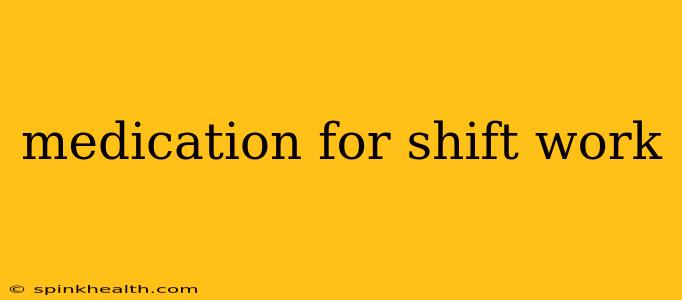Conquering the Clock: Finding Relief from Shift Work Sleep Disorder
The relentless hum of the factory, the quiet intensity of the emergency room, the hushed urgency of the night shift – for millions, the demands of shift work are a constant companion. But for many, this constant companion comes with a heavy price: shift work sleep disorder (SWSD). This isn't just about feeling tired; it's a serious disruption of the body's natural sleep-wake cycle, impacting health, relationships, and even safety. And while lifestyle changes are crucial, sometimes medication can be a vital tool in the fight against SWSD.
This isn't a simple "here's the pill" solution. The right approach depends on individual needs, the severity of the SWSD, and a conversation with your doctor. Let's explore the world of medication for shift work, addressing some common questions along the way.
What Medications are Used to Treat Shift Work Sleep Disorder?
This is often the first question on people's minds. The good news is that there are several avenues a doctor might explore. Think of it less like a one-size-fits-all approach and more like a carefully tailored strategy. One key medication category is melatonin receptor agonists. These medications mimic the effects of melatonin, a hormone that regulates sleep. They can help to regulate the sleep-wake cycle, making it easier to fall asleep and stay asleep at the required times.
Another option that might be considered is a type of medication called modafinil. This isn't a sleep aid in the traditional sense; instead, it's a wakefulness-promoting agent. It can help to combat excessive daytime sleepiness, a common symptom of SWSD. However, it's crucial to understand that modafinil is not a substitute for sufficient sleep. It helps with wakefulness but doesn't address the underlying sleep disruption.
In some cases, doctors may also consider other medications, such as benzodiazepines or non-benzodiazepine hypnotics. These are usually reserved for more severe cases or when other treatments haven't been effective. It's important to note that these medications can be habit-forming, so their use is carefully monitored.
What are the Side Effects of Medications for Shift Work Sleep Disorder?
Like any medication, those used to treat SWSD can have side effects. These can vary depending on the individual and the specific medication. Common side effects of melatonin receptor agonists might include headaches, dizziness, and nausea. Modafinil can sometimes cause nervousness, anxiety, or difficulty sleeping at night. Benzodiazepines and non-benzodiazepine hypnotics carry a higher risk of dependence and withdrawal symptoms. Open communication with your doctor is key to understanding and managing any potential side effects.
Can I Take Over-the-Counter Sleep Aids for Shift Work Sleep Disorder?
While over-the-counter sleep aids might offer temporary relief, they're generally not recommended as a long-term solution for SWSD. They often don't address the root cause of the problem, and overuse can lead to dependence and other health complications. Moreover, some of these medications can interact negatively with prescription drugs. It’s best to discuss your options with your healthcare provider.
How Do I Find the Right Medication for My Shift Work Sleep Disorder?
The journey to finding the right medication involves a partnership with your doctor. They will consider your medical history, the severity of your symptoms, and any other medications you're taking. They might start with a lower dose and gradually increase it as needed, closely monitoring your response. This process might involve trial and error, as different medications affect individuals differently. It's important to be patient and communicate openly about your experiences with your doctor.
Are There Any Non-Medication Treatments for Shift Work Sleep Disorder?
While medication can be a helpful tool, it’s not the only answer. Lifestyle changes are crucial in managing SWSD. This includes creating a consistent sleep schedule as much as possible, even on days off; making your bedroom dark, quiet, and cool; and limiting caffeine and alcohol, particularly close to bedtime. Regular exercise, a healthy diet, and stress-management techniques can also significantly improve sleep quality.
The struggle with shift work sleep disorder is real, but it's not insurmountable. By combining the right medication strategy (under a doctor's guidance) with proactive lifestyle adjustments, many shift workers can find relief and improve their overall health and well-being. Remember, you’re not alone, and effective solutions are available. Don't hesitate to seek professional help.

